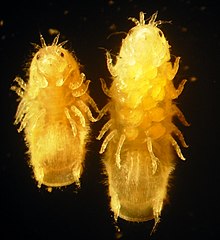No really. It may be a small grub-like creature:

photo by
that chomps into seawater-soaked wood (causing damage to piers, jetties and boats, and therefore much annoyance to humans) but, just think: in the age of wooden ships they sailed the seas so successfully that no one now can be sure where they originally came from.
(Mind you, they didn't do much for the hulls of the ships in which they were sailing. Gribble holes can be several centimetres long.)
Still, they are wonderful. When under attack gribbles (in common, curiously, with wombats) jam their tough rear parts, in the case of gribbles their pleotelsons, into the opening of their burrows to block it.
Now these wonders are surely enough to earn gribbles an honourable place in the rich biodiversity of the world, but there's more. Research is now going on to see whether gribbles can break down wood or straw in seawater to produce sugar, and therefore bio-fuel, in a sustainable way.
Okay, okay. So they're just a sort of grub-type thing.
But then, consider: exactly what do you do to help the world's environment a better place?
Word To Use Today: gribble. If you have no need to discuss marine pests then gribble is very satisfying used in the place of a swear word.
The gribble was first described scientifically by the Norwegian Jens Rathke in 1799. The word might be related to the word grub.
No comments:
Post a Comment
All comments are very welcome, but please make them suitable for The Word Den's family audience.